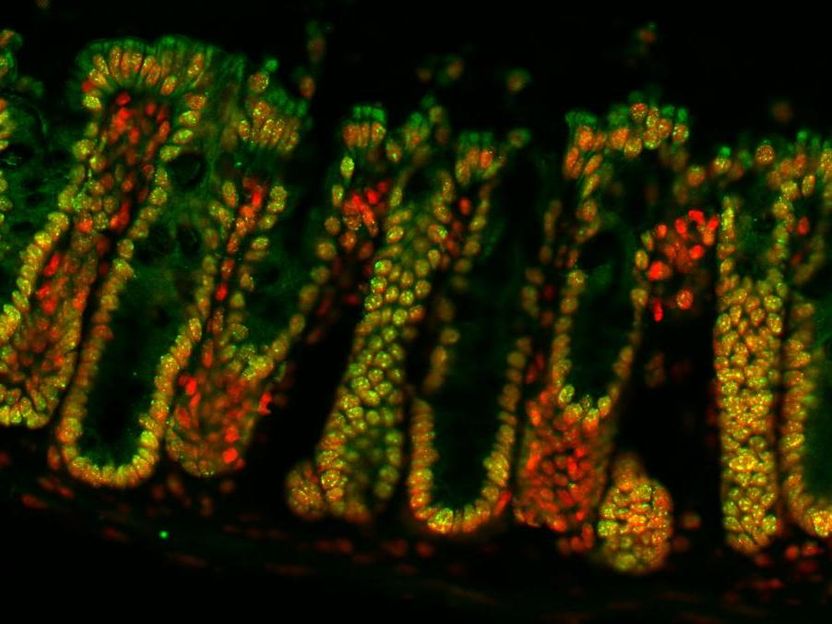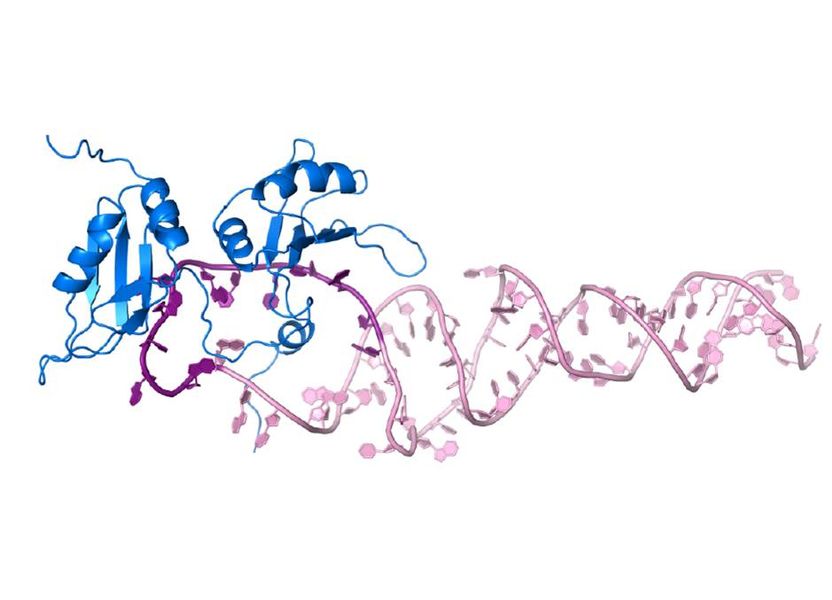How good bacteria control your genes
Scientists from the Babraham Institute near Cambridge in collaboration with colleagues from Brazil (here and here) and Italy have discovered a way that good bacteria in the gut can control genes in our cells. The work shows that chemical messages from bacteria can change the location of key chemical markers throughout the human genome. By communicating in this way, the bacteria may help to fight infections and to prevent cancer.

This is an image of the lining of the large intestine of a mouse. DNA is marked in red with the epigenetic marker known as crotonylation shown in green. Yellow shows areas where crotonylation and DNA are found together. Signals from gut bacteria can change the amount of crotonylation in the gut and so influence gene activity.
Dr Juri Kazakevych, Babraham Institute
This work, led by Dr Patrick Varga-Weisz shows how chemicals produced by bacteria in the gut from the digestion of fruit and vegetables can affect genes in the cells of the gut lining. These molecules, called short chain fatty acids, can move from the bacteria and into our own cells. Inside our cells, they can trigger processes that change gene activity and that ultimately affect how our cells behave.
This new research shows that the short chain fatty acids increase the number of chemical markers on our genes. These markers, called crotonylations, were only discovered recently and are a new addition to the chemical annotations in the genome that are collectively called epigenetic markers. The team showed that short chain fatty acids increase the number of crotonylations by shutting down a protein called HDAC2. Scientists think that changes in crotonylation can alter gene activity by turning genes on or off.
The team studied mice that had lost most of the bacteria in their gut and showed that their cells contained more of the HDAC2 protein than normal. Other research has shown that an increase in HDAC2 can be linked to an increased risk of colorectal cancer (here and here). This could mean that regulating crotonylation in the genome of gut cells is important for preventing cancer. It also highlights the important role of good bacteria and a healthy diet in this process.
This research was made possible by support from the bilateral BBSRC-Brazil fund established as part of an agreement between Research Councils UK (RCUK) and the State of Säo Paulo Research Foundation (FAPESP) to welcome, encourage and support collaborative research between the UK and Brazil.
First author, Rachel Fellows, said: "Short chain fatty acids are a key energy source for cells in the gut but we've also shown they affect crotonylation of the genome. Crotonylation is found in many cells but it's particularly common in the gut. Our study reveals why this is the case by identifying a new role for HDAC2. This, in turn, has been implicated in cancer and offers an interesting new drug target to be studied further."
Lead scientist Dr Patrick Varga-Weisz, said: "Our intestine is the home of countless bacteria that help in the digestion of foods such as plant fibres. They also act as a barrier to harmful bacteria and educate our immune system. How these bugs affect our cells is a key part of these processes. Our work illuminates how short chain fatty acids contribute to the regulation of proteins that package the genome and, thus, they affect gene activity."
Original publication
Other news from the department science

Get the life science industry in your inbox
By submitting this form you agree that LUMITOS AG will send you the newsletter(s) selected above by email. Your data will not be passed on to third parties. Your data will be stored and processed in accordance with our data protection regulations. LUMITOS may contact you by email for the purpose of advertising or market and opinion surveys. You can revoke your consent at any time without giving reasons to LUMITOS AG, Ernst-Augustin-Str. 2, 12489 Berlin, Germany or by e-mail at revoke@lumitos.com with effect for the future. In addition, each email contains a link to unsubscribe from the corresponding newsletter.
Most read news
More news from our other portals
Last viewed contents

New insight into the maturation of miRNAs

New biodegradable plastics are compostable in your backyard
Category:Human_anatomy
Muscarinic_acetylcholine_receptor
Breakthrough model holds promise for treating Graves' disease - Animal model first to simulate eye complications of thyroid disorder
Young's_syndrome

TechPivot GmbH - Berlin, Germany
ThromboGenics Announces that Microplasmin Meets Primary Endpoint in Phase III Trial for Vitreomacular Adhesion - Highly significant trial result (p=0.003) demonstrates the potential of microplasmin in the treatment of retinal disease






















































